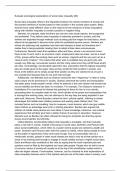Evaluate sociological explanations of social class inequality [40]
Social class inequality refers to the disparities between the richest members of society and
the poorest members of society based on their position in the societal class system. Many
theories have vastly different views on the reasons for the existence of these inequalities,
along with whether inequality is overall a positive or negative thing.
Marxists, for example, state that there are only two main social classes, the bourgeoisie
and proletariat. They believe class inequality is extremely prevalent in society, and that
workers are exploited through methods such as being paid low wages for hard labour, which
allows the bourgeoisie to become richer while the proletariat become poorer. Workers are
tricked into believing that capitalism has their best interests at heart and therefore don’t
realise they’re being exploited, leading them to adopt a false class consciousness.
Furthermore, Marxists claim that capitalism ebbs and flows, where in an economic boom
there is lots of work, and in an economic crash, employment rates are lower, and as a result
of this, groups within the working class such as women, migrants and the very poor act as a
‘reserve army of labour’. This means that when work is available they are given jobs with
usually very little pay, as business owners and the ruling class know they will fill these empty
job roles. Contrastingly, functionalists reject this view, and believe that the highest rewarding
jobs are mostly given to the upper class as they worked for their position in society, and
those at the bottom are to simply accept their position as they are claimed to be at such a
low societal level because they do not work hard enough.
Additionally, neo-Marxists such as Gramsci coined the term “hegemony” to refer to ruling
class culture and its dominance in society. Gramsci observed the control and manipulation
that takes place inside people's minds, which he believes is the main reason that society has
not yet rebelled and there has been no revolution. For example, Tom Sawyer’s character in
Huckleberry Finn convinced his friends that painting his fence for him is a fun activity,
persuading them to complete tasks for him, which alludes to the power and manipulation that
is amongst the working class, who are oblivious to the way they are being exploited in low-
paid work. Moreover, Pierre Bourdieu coined the term ‘cultural capital’, referring to certain
advantages that middle class children possess and working class children lack. This
includes factors such as travelling, trips to museums, music lessons, which can give middle
class children an advantage even prior to starting education. Bordieu also argued that
children of middle class parents are more likely to have knowledge, behaviour, and cultural
experiences that will likely give them a better chance of success in education. However,
Marxists such as Bordieu are often criticised for being too simplistic and that they ignore
issues around gender and ethnicity.
Unlike Marxists, functionalists believe that inequality is inevitable, and that it actually
plays a vital role in society. Instead of focusing on social class, Durkheim and Parsons talk
about social stratification, which refers to a system where people are ranked by wealth and
power. Durkheim and Parsons claim that this system is mobile, which allows people to move
up the ladder of opportunity if they work hard enough. Due to functionalists' idea of a
meritocratic society, people in lower social classes are said to only be at that position as a
result of not working hard enough to engage in social mobility and join a higher social class.
Davis and Moore also contribute to this view by saying that the most important jobs and
positions must be filled by the brightest and most able people. People who do well in terms
of common values of society will usually be at the top of the stratification system which is
often the higher classes. Functionalists, however, can be criticised for their explanations of
class inequality because some of the highest paid jobs are of the least value to society, such




